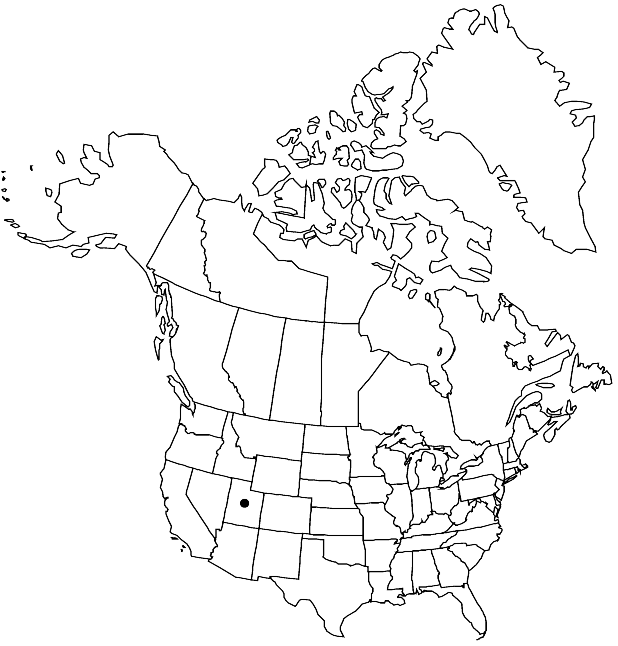Draba inexpectata
in S. L. Welsh et al., Utah Fl. ed. 3, 272. 2003.
Perennials; (cespitose); caudex simple or branched (with persistent leaf remains); not scapose. Stems unbranched, 0.1–0.4 dm, pubescent, trichomes 5–10-rayed, 0.05–0.2 mm, and fewer, simple and 2-rayed ones, 0.3–0.6 mm. Basal leaves rosulate; subsessile; petiole ciliate; blade obovate to oblanceolate, 0.2–0.4 cm × 0.7–1.5 mm, (base sparsely ciliate, trichomes simple and 2-rayed, 0.4–0.6 mm), margins entire, surfaces densely pubescent with subsessile, 6–12-rayed, stellate trichomes, 0.25–0.7 mm. Cauline leaves 1–3 (or 4); sessile; blade ovate to lanceolate, margins entire or denticulate, surfaces pubescent as basal. Racemes 2–5(–8)-flowered, proximalmost 1–3 flowers bracteate, slightly elongated in fruit; rachis not flexuous, pubescent, trichomes 5–10-rayed. Fruiting pedicels ascending, straight, 0.7–2(–3) mm, pubescent as rachis. Flowers: sepals (sometimes persistent), ovate, 1.2–1.7 mm, pubescent, (trichomes simple and branched); petals white, obovate, 2–2.5 × 1–1.2 mm; anthers ovate, 0.1–0.2 mm. Fruits elliptic to lanceolate, slightly twisted or plane, flattened, 3.5–5 × 1.5–2 mm; valves pubescent, trichomes short-stalked, (3 or) 4(–6)-rayed, 0.1–0.2 mm; ovules 16–24 per ovary; style 0.2–0.4 mm. Seeds oblong, 0.7–1 × 0.4–0.5 mm.
Phenology: Flowering Jul–Aug.
Habitat: Rocky ridges and slopes, on accumulated soil among boulders, subalpine fir and juniper communities
Elevation: 3100-3700 m
Discussion
Of conservation concern.
Draba inexpectata is known from the Uinta Mountains in Summit County. The measurements above are based on the holotype (Franklin 6328) and two of the three paratypes (Franklin 6293, 6331), all at BRY. One paratype (Goodrich 26166, BRY) is a robust, completely sterile plant of uncertain identity and was not used for the description above.
Although compared in the original description with Draba lonchocarpa (with which it grows sympatrically), D. inexpectata appears most closely related to D. cana. Draba inexpectata is distinguished from the latter by having stems 1–4 cm, basal leaves non-ciliate, racemes that are 2–5(–8)-flowered and scarcely elongated in fruit, fruits elliptic to lanceolate, 3.5–5 mm, and ovules 16–24 per ovary. By contrast, D. cana has stems (6–)10–30 cm, basal leaves ciliate at the apex, racemes that are (10–)15–47(–63)-flowered and often considerably elongated in fruit, fruits linear-lanceolate or very rarely ovate-oblong, (5–)6–11 mm, and ovules 28–48 per ovary.
Selected References
None.
